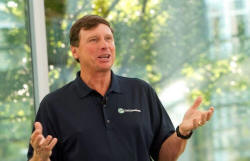|
Jim Kennedy keeps the Cox
empire going strong after 118 years
 Send a link to a friend
Send a link to a friend
 [November 08, 2016]
By Chris Taylor [November 08, 2016]
By Chris Taylor
NEW
YORK (Reuters) - Vast family fortunes may be rare, but here is something
even rarer: Family fortunes that last.
Whether due to spoiled heirs or investment blunders, the money is
usually gone within a generation or two.
Not so with Cox Enterprises, the media giant chaired by Jim Kennedy,
grandson of founder and former Ohio governor James Cox.
Founded in 1898, the firm - with tentacles in TV and cable, radio,
broadband and newspapers - ranks #16 among America's largest private
companies, and Kennedy is the nation's 42nd richest person, according to
Forbes magazine. (Fun fact: His sister, Blair Parry-Okeden, is one of
the richest women in Australia.)
Kennedy, 68, sat down with Reuters for our series "Life Lessons," to
chat about what he has learned from a lifetime in the family business.
Q: Your granddad was an impressive guy and founded the company, but died
back in 1957 - did he have the chance to pass along any lessons to you?

A: Hard work pays off. He was only 28 when he started our company.
Before that, he was a farmer and a teacher. He was a hard worker who
gave 110 percent to every endeavor. He was never complacent, and was
always thinking about what was next.
He was committed to his employees and the communities his company
served. He was so committed that he asked his descendants to take care
of them in his will.
Q: Who else was a major influence on you?
A: My mom. She was a fierce competitor, but she didn't like show-offs.
She taught me that everyone is equal, and you work hard for what you get
in life. She also instilled in me the value of helping others. It is the
right thing to do. These are life lessons that are still part of who I
am today.
Q: Most family fortunes go away after a couple of generations - why is
that, and how have you managed to avoid that trend?
A: It can't just be about the money. It also has to be about doing good
and being a contributor to society. We are extremely proud of our
company's products and services, but we're even more proud of programs
like the Cox Employee Relief Fund and Cox Conserves. These let us help
employees in need, and lessen our impact on the environment. Our family
rallies behind this because we want to leave the company and the world
in a better place than we found it. Doing something good creates
solidarity.
Q: Who do you hold up as a role model in life and business?
[to top of second column] |

Jim Kennedy chariman of Cox Enterprises. REUTERS/Cox Enterprises

A: Ambassador Andrew Young said something to me many years ago, and it
has really stuck with me. Businesses can feed more hungry, clothe more
naked and cure more sick people than government ever can. Businesses
move the world. He is a diplomat, but deep down, he has always been a
pastor. He cares about people and that has given him a successful life.
Q: You support a number of philanthropic causes - how do you figure out
where your dollars can have the most impact?
A: Rather than trying to support everything, find something that
resonates with you personally and that you are passionate about. Three
causes that are particularly important to me are education, healthcare
and sustainability.
Q: Any money mistakes you made along the way, that you would like to
have back?
A: If you have not made a mistake, you are doing something wrong. I try
to create an environment where people are not afraid to bring crazy
ideas to me. It is okay to fail once. Just don't fail at the same thing
twice.
Q: How would you define success?
A: I don't look at success as how wealthy I am. To me, success is
leaving the company and the environment in better shape for future
generations.
Q: What money lessons would you like to pass down to the next Cox
generation?
A: It is our family's responsibility to preserve this company that my
grandfather started. Investing is important. You need to invest dollars
in the business, in people and in the community. Doing what is good for
the community doesn't have to be separate from growing the business.
(Editing by Beth Pinsker and Paul Simao)
[© 2016 Thomson Reuters. All rights
reserved.] Copyright 2016 Reuters. All rights reserved. This material may not be published,
broadcast, rewritten or redistributed.
 |